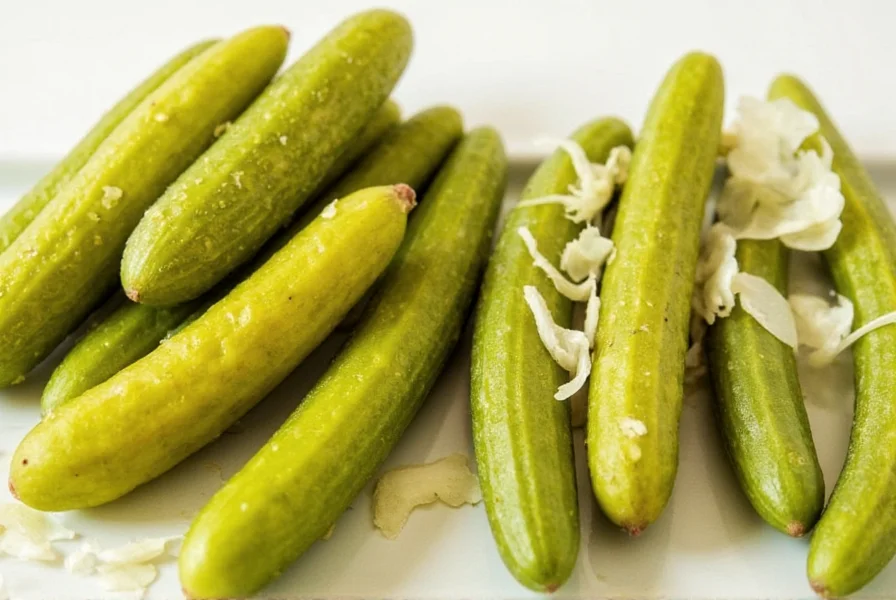Table of Contents
Yes, some pickles are fermented, but not all pickles undergo fermentation. The answer to "are pickles considered fermented" depends on how they're made. Traditional fermented pickles use a saltwater brine process that takes weeks, while most store-bought pickles are made with vinegar and aren't technically fermented. Understanding this distinction helps you choose the right pickles for your health needs and culinary preferences.

What Is Fermentation?
Fermentation is a natural biochemical process where microorganisms like bacteria, yeast, or fungi convert carbohydrates to alcohol or organic acids. In the case of pickles, lactobacillus bacteria transform cucumber sugars into lactic acid, creating that characteristic tangy flavor while preserving the vegetables.

Unlike vinegar-based preservation, fermentation creates living foods rich in beneficial bacteria. This process has been used for thousands of years to preserve seasonal produce and enhance nutritional value. When asking "are pickles fermented," it's crucial to understand this biological process versus simple acid preservation.
The Pickle Process: Brine vs. Fermentation
Pickling encompasses two distinct methods that answer the question "are pickles considered fermented" differently:
- True fermentation (lacto-fermentation): Cucumbers submerged in saltwater brine (typically 3-5% salt solution) at room temperature for 1-6 weeks. Natural bacteria convert sugars to lactic acid, creating probiotics and complex flavors.
- Vinegar pickling (quick pickling): Cucumbers soaked in a vinegar solution, often with heat processing. This method preserves instantly but doesn't create probiotics.
The key difference when determining if pickles are fermented lies in the preservation method. True fermented pickles develop flavor gradually through microbial activity, while vinegar pickles get their sour taste immediately from added acetic acid.
Fermented Pickles: The Real Deal
Authentic fermented pickles, sometimes labeled as "naturally fermented" or "lacto-fermented," represent the traditional method of pickle making. These are the pickles people refer to when discussing "are pickles fermented" in the true biological sense.
Key characteristics of genuinely fermented pickles:
- Production method: Saltwater brine only (no vinegar), room temperature fermentation for days to weeks
- Label indicators: "Refrigerate," "contains live cultures," "unpasteurized," "naturally fermented"
- Ingredients list: Cucumbers, water, salt, spices (dill, garlic), no vinegar or preservatives
- Health benefits: Rich in probiotics (lactobacillus), enhanced nutrient absorption, natural enzymes
- Flavor development: Complex sourness that evolves over time, often described as "tangy" rather than "sharp"
If you're specifically looking for fermented pickles for gut health, these are the ones to choose. They're typically found in the refrigerated section of grocery stores, not on regular shelves.
Non-Fermented Pickles: The Quick Fix
Most commercial pickles found on grocery store shelves are not fermented. These vinegar-based pickles answer the question "are pickles fermented" with a clear "no" - they're preserved through acidification rather than biological fermentation.
Characteristics of non-fermented (vinegar) pickles:
- Production method: Vinegar solution (5% acidity minimum), often heated for canning
- Shelf placement: Sold in aisles at room temperature (not refrigerated)
- Ingredients list: Contains vinegar, often with sugar, preservatives, and artificial colors
- Texture: Often softer due to heat processing
- Flavor profile: One-dimensional sourness from acetic acid, without the complexity of fermented pickles
While these don't offer probiotic benefits, they provide consistent flavor and longer shelf stability. When someone asks "are store pickles fermented," the answer is typically no - most commercial brands use vinegar for efficiency and consistency.
Frequently Asked Questions
Are all pickles fermented?
No, most store-bought pickles are not fermented. Only pickles made through saltwater brine fermentation without vinegar are truly fermented. Vinegar-based pickles undergo acid preservation, not biological fermentation.
How can I tell if my pickles are fermented?
Look for these indicators: refrigerated section placement, "unpasteurized" or "contains live cultures" on the label, ingredients listing only cucumbers, water, salt and spices (no vinegar), and natural cloudiness in the brine. Fermented pickles continue to develop flavor over time.
What's the difference between fermented and vinegar pickles?
Fermented pickles use saltwater brine and natural bacteria to create lactic acid over weeks, developing complex flavors and probiotics. Vinegar pickles use acetic acid (vinegar) with heat for immediate preservation, creating a sharper, one-dimensional sour taste without probiotic benefits.
Do fermented pickles have probiotics?
Yes, properly fermented and unpasteurized pickles contain live probiotic bacteria, particularly lactobacillus species. These beneficial microbes support gut health. Pasteurized fermented pickles or vinegar-based pickles do not contain live probiotics.
Why do some pickles need refrigeration while others don't?
Fermented pickles that are unpasteurized contain live cultures that continue to ferment at room temperature, which can cause the jars to bulge. Refrigeration slows this process. Vinegar-based pickles are shelf-stable because the high acidity prevents bacterial growth.
How long do fermented pickles last?
Properly stored fermented pickles can last 1-2 years in the refrigerator. Signs they've gone bad include mold on the surface, slimy texture, or unpleasant odors. Vinegar-based pickles typically last 1-2 years unopened at room temperature, and 2-4 months after opening in the refrigerator.
Are refrigerator pickles fermented?
Not necessarily. "Refrigerator pickles" often refers to quick vinegar pickles stored in the fridge, not true fermented pickles. True fermented pickles require refrigeration after the initial room-temperature fermentation period to slow the fermentation process.
Are kosher dill pickles fermented?
Traditional kosher dill pickles are fermented, but many commercial versions are vinegar-based. Authentic fermented kosher dills will be refrigerated and contain no vinegar in the ingredients. Check labels carefully when asking "are kosher dills fermented".
Buying Guide: How to Choose Your Pickles
Understanding the difference between fermented and non-fermented pickles is crucial when shopping. Here's how to identify genuinely fermented pickles versus vinegar-based alternatives:
| Criteria | Fermented Pickles | Vinegar Pickles |
|---|---|---|
| Location in Store | Refrigerated section | Room temperature aisles |
| Label Claims | "Naturally fermented," "contains live cultures," "unpasteurized," "probiotic" | "Pickled with vinegar," "shelf-stable," "pasteurized" |
| Ingredients | Cucumbers, water, salt, spices (no vinegar) | Cucumbers, vinegar, water, salt, sugar, preservatives |
| Brine Appearance | Slightly cloudy | Clear |
| Flavor Profile | Complex, tangy, evolving sourness | Sharp, one-dimensional sourness |
| Health Benefits | Contains live probiotics, supports gut health | No probiotics, mainly flavor enhancement |
Shopping Tips for Fermented Pickles
- Check the refrigeration requirement: Truly fermented pickles must be refrigerated to slow the ongoing fermentation process
- Examine the ingredient list: Authentic fermented pickles contain no vinegar - just cucumbers, water, salt, and spices
- Look for cloudiness: Natural fermentation creates cloudy brine from bacterial activity
- Avoid pasteurized products: Pasteurization kills the beneficial bacteria that make fermented pickles special
- Consider the price: True fermented pickles typically cost more due to longer production time
When shopping, remember that terms like "kosher dill" or "bread and butter" don't indicate fermentation status - these can be made either way. The only reliable indicators are the ingredients list and storage requirements.
Conclusion
The question "are pickles fermented" has a nuanced answer: some pickles are fermented through natural lacto-fermentation, while most commercial pickles use vinegar and aren't technically fermented. True fermented pickles offer probiotic benefits and complex flavors but require refrigeration and have a shorter shelf life. Vinegar pickles provide consistent flavor and convenience but lack the health benefits of genuine fermentation.
When choosing pickles, consider your priorities: if gut health is important, seek out refrigerated, vinegar-free options labeled as "naturally fermented" or "containing live cultures." If you're after consistent flavor and shelf stability, vinegar pickles serve that purpose well.
Now that you know how to identify fermented pickles versus vinegar pickles, you can make informed choices that match your dietary needs and taste preferences. The next time you wonder "are pickles fermented," you'll have the knowledge to find the right answer for your situation.










 浙公网安备
33010002000092号
浙公网安备
33010002000092号 浙B2-20120091-4
浙B2-20120091-4